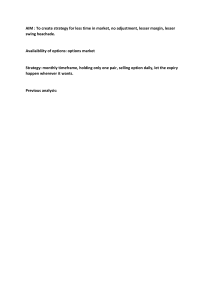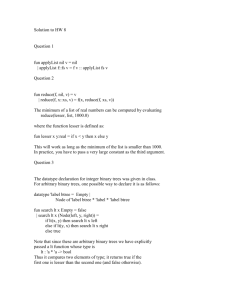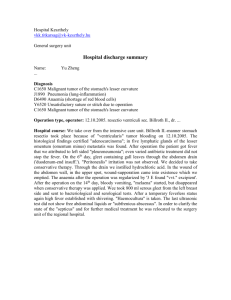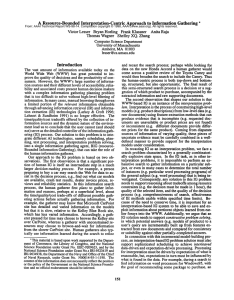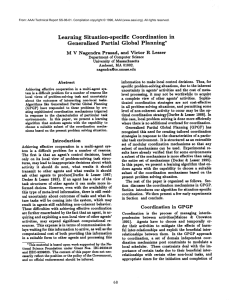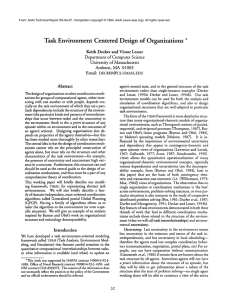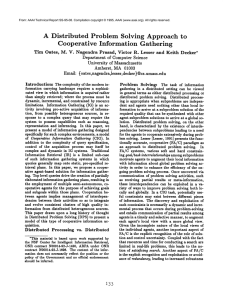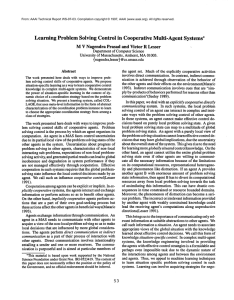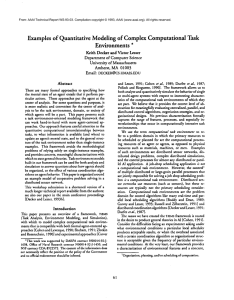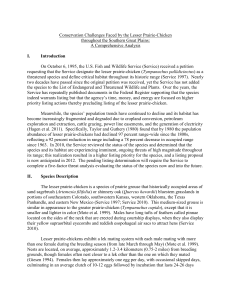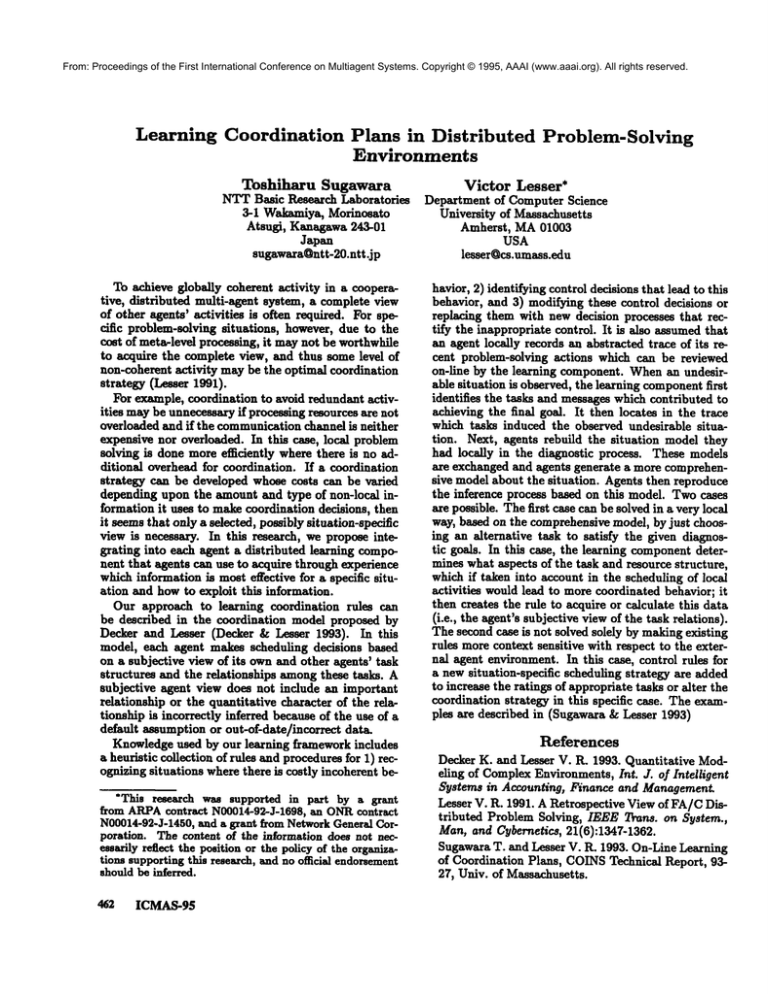
From: Proceedings of the First International Conference on Multiagent Systems. Copyright © 1995, AAAI (www.aaai.org). All rights reserved.
Learning
Coordination
Plans in Distributed
Environments
Toshiharu Sugawara
NTT Basic Research Laboratories
3-1 Wakaro~ya, Morinosato
Atsugi, Kanagawa 243-01
Japan
sugawaraOntt-20.ntt.jp
To achieve globally coherent activity in a cooperative, distributed multi-agent system, a complete view
of other agents’ activities is often required. For specific problem-solving situations, however, due to the
cost of meta, level processing, it maynot be worthwhile
to acquire the complete view, and thus some level of
non-coherent activity may be the optimal coordination
strategy (Lesser 1991).
For example, coordination to avoid redundant activities maybe unnecessary if processing resources are not
overloaded and if the communicationchannel is neither
expensive nor overloaded. In this case, local problem
solving is done more efficiently where there is no additional overhead for coordination. If a coordination
strategy can be developed whose costs can be varied
depending upon the amount and type of non-local information it uses to make coordination decisions, then
it seems that only a selected, possibly situation-specific
view is necessary. In this research, we propose integrating into each agent a distributed learning component that agents can use to acquire through experience
which information is most effective for a specific situation and how to exploit this information.
Our approach to learning coordination rules can
be described in the coordination model proposed by
Decker and Lesser (Decker & Lesser 1993). In this
model, each agent makes scheduling decisions based
on a subjective view of its own and other agents’ task
structures and the relationships amongthese tasks. A
subjective agent view does not include aa important
relationship or the quantitative character of the relationship is incorrectly inferred because of the use of a
default assumption or out-of-date/incorrect data.
Knowledgeused by our learning framework includes
a heuristic collection of rules and procedures for 1) recognizing situations where there is costly incoherent be"This research was supported in part by a grant
from ARPAcontract N00014-92-J-1698, aa ONRcontract
N00014-92-J-1450,and a grant from NetworkGeneral Corporation. The content of the information does not necessarily reflect the position or the policy of the organizations supporting this research, and no official endorsement
should be inferred.
462
ICMAS-9$
Problem-Solving
Victor Lesser*
Department of Computer Science
University of Massachusetts
Amherst, MA01003
USA
lesserQcs.umass.edu
havior, 2) identifying control decisions that lead to this
behavior, and 3) modifying these control decisions or
replacing them with new decision processes that rectify the inappropriate control. It is also assumedthat
an agent locally records aa abstracted trace of its recent problem-solving actions which can be reviewed
on-line by the learning component. Whenan undesirable situation is observed, the learning componentfirst
identifies the tasks and messages which contributed to
achieving the final goal. It then locates in the trace
which tasks induced the observed undesirable situation. Next, agents rebuild the situation model they
had locally in the diagnostic process. These models
are exchanged and agents generate a more comprehensive model about the situation. Agents then reproduce
the inference process based on this model. Twocases
are possible. The first case can be solved in a very local
way, based on the comprehensive model, by just choosing an alternative task to satisfy the given diagnostic goals. In this case, the learning componentdetermines what aspects of the task and resource structure,
which if taken into account in the scheduling of local
activities would lead to more coordinated behavior; it
then creates the rule to acquire or calculate this data
(i.e., the agent’s subjective view of the task relations).
The second case is not solved solely by makingexisting
rules more context sensitive with respect to the external agent environment. In this case, control rules for
a new situation-specific scheduling strategy are added
to increase the ratings of appropriate tasks or alter the
coordination strategy in this specific case. The exampies are described in (Sugawara & Lesser 1993)
References
Decker K. and Lesser V. R. 1993. Quantitative Modeling of ComplexEnvironments, Int. J. of Intelligent
Systems in Accounting, Finance and Management,
Lesser V. R. 1991. A Retrospective View of FA/CDistributed Problem Solving, IEEE Trans. on System.,
Man, and Cybernetics, 21(6):1347-1362.
Sugawara T. and Lesser V. R. 1993. On-Line Learning
of Coordination Plans, COINSTechnical Report, 9327, Univ. of Massachusetts.

